英语省略句 课件
英语语法之省略完美课件

3. 状语从句中的省略 (1) When (she was) asked, she didn't answer a word. (2) He likes dogs more than cats. (3) It is colder in Beijing than in Hunan.
精品
4. 名词性从句中的省略 规则1:引导宾语从句的连词that在口语中常常省略
(2)在can not but, can not choose but, can do nothing but…, can't help but…, prefer to do... rather than do…, would rather do…than…之后的动词不定式一 般不带to。
(3)在并列结构中为了避免重复,后一个to省略,如: I'm really puzzled what to think or say.
规则2:省略谓语 在某些特定的环境中,由于语言所指清楚,为了避免重复 ,常将谓语动词省略,留下主语和其他成分;如果谓语部 分全部省略,而只留下主语时,主语代词用宾格,如:(2) 。 — Jack would go to the Expo精n品ext week.
规则3:省略主语和谓语(或谓语的一部分) 在某些具体的场合下,主语和谓语都很明确,于 是为了简单或情感亲切等,可将主语和谓语同时 省略,只剩下表语、宾语、状语或其他成分,如 :(3) Another apple, please.
规则2:小品词to的省略 (1)在see, watch, hear, feel, observe, notice, look at, listen
to等感观动词及使役动词let, make, have 后的“宾语 + 动词不定式作宾语补足语”的结构中,不定式符 号to须省略,但这类结构变成被动语态时,其后的 不定式要还原加上to。 精品
(完整版)高中英语语法省略句
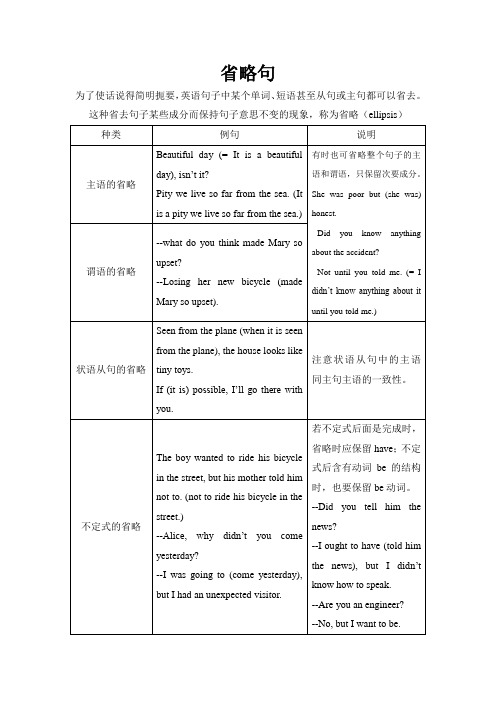
省略句为了使话说得简明扼要,英语句子中某个单词、短语甚至从句或主句都可以省去。
这种省去句子某些成分而保持句子意思不变的现象,称为省略(ellipsis)Ⅰ、状语从句中的省略用法一、如果从句的主语和主句的主语一致,且从句的谓语含有be动词的某种形式(am/is/are/was/were),可同时省略从句的主语和be动词的某种形式。
1、when,while引导的时间状语从句e.g. Do be careful when (you are) crossing the street.When/While (I was) on my way to work, I met her.2、if,unless,once引导的条件状语从句e.g. If (it is) properly treated, waste will do no harm to the environment.I’ll not go to the party unless (I am) invited.Once (you are) caught stealing in a supermarket, you will be punished.3、though,although,whether,no matter whether/what/how/who等引导的让步状语从句e.g. He was happy, though/although (he was) poor.Whether (she is) sick or well, she is always cheerful.No matter how/However hard the task (is), we must fulfill it in time.(注:从句的主语和主句的主语不一致时,只省略从句中的be动词形式)4、as if,as though引导的方式状语从句e.g. He rubbed his eyes and yawned as if/though (he was) waking up after along sleep.He stood up as if/though (he wanted) to leave.(as if/though + to do表示一个将来的动作)二、than,as引导的比较状语从句中的省略用法:当不同的主语进行比较时,一般省略从句中的谓语;当从句中的主语与谓语(be动词除外)和主句中的主语与谓语相同时,通常省略从句中的主语和谓语,只保留比较部分。
英语语法省略句

省略句1)不定式在love, mean, want, like, wish, expect, try, intend, plan, refuse, prefer, seem等动词后面2)在happy,glad,eager,ready,willing等形容词后面。
1.---will you join us?--- I should love to(join you).2.I asked him to see the fil m, but he didn’t want to(see the film).3.--- Would you like to go with us?--- Yes, I’m glad to(go with you)4.He doesn’t get up early as he used to. (get up)注意: 如果不定式中含有be, have(助动词), have been, 通常保留be, have(助动词), have been.1.--- Are you a sailor?--- No, but I used to be.2.---He hasn’t finished yet.---well, he ought to have.1. —I'll be away on a business trip. Would you mind looking after my cat?—Not at all, ________ . (NMET 1995)A. I have no timeB. I'd rather notC. I‘d like itD. I'd be happy to2. —Does your brother intend to study German?—Yes, he intends ________ . (NMET 1998上海卷)A. /B. toC. soD. that5.--- He hasn’t gone to the office up to now.--- Well, he _____.A. shouldB. ought toC. ought to goD. ought to have4. —You should have thanked her before you left.—I meant ________ , but when I was leaving I couldn't find her anywhere. (NMET 2000北京春招卷)A. to doB. toC. doingD. doing to替代词so / not用于避免重复前面所说过的内容。
英语中的省略句

• The problem was a continuous worry to me until it was solved. • Until solved,the problem was a continuous worry to me.
• The young man was listening to music all the time while he was working at the computer.
英语中的省略句பைடு நூலகம்
• 在时间、让步、方式、条件等状语从句中,即由 when、while、although、unless、if、as if等引导 的从句中,如果从句的主语与主句主语一致,或 者主语是it,且在谓语动词中含有be时,常省略从 句的主语和be动词。 • Be careful when(you are)crossing the street.当你 过马路的时候要小心。 • He won’t go to the party unless(he is)invited.除 非收到邀请,否则他不会参加聚会。 •
• He opened his lips as if(he were)to speak.他张开 嘴好像有话说。
• After she learned some simple Chinese,the American girl was able to communicate with the other students in her class. • After learning some simple Chinese,the American girl was able to communicate with the other students in her class.
高中英语语法——省略句(26张PPT)

please.
的一部分)
A: Would you like to
come to the party? B: I’d love to (come the
party).
不定式后 省略动词
They do not visit their parents
as much as they ought to (visit
பைடு நூலகம்
— Well, her parents wouldn’t allow
her to go to the party, but she
still _____.
A. hopes to
B. hopes so
C. hopes not
D. hopes for
(江苏2017)
4. — Have you got any particular
You can borrow my first aid notes if you want to (borrow my first aid notes).
不定式后省略动词
7) Sounds like a good idea. (It) sounds like a good idea.
8) Anything I can do for you? (Is there) anything I can do for you?
5. Sorry to hear that. I’m sorry to hear that.
6. Pity you couldn’t come.
It’s/ What a pity you couldn’t come. 7. This way, please.
Step this way, please.
英语特殊句式-倒装句,省略句,强调句

英语特殊句式-倒装句,省略句,强调句(总22页)--本页仅作为文档封面,使用时请直接删除即可----内页可以根据需求调整合适字体及大小--★特殊句式★倒装(1)一、倒装倒装句可分下列三种:(1) 动词 + 主词(2) 助动词(do, does, did) + 主词 + 原形动词 (一般疑问句的句型)(3) 助动词(will, can, should) + 主词 + 原形动词(1) 否定字放句首否定字 + ⎩⎨⎧+++原形动词主词助动词主词动词be be 动词才能拿到主词前面,一般动词要在主词前面加助动词。
否定字就是从中文解释去判断其是否有否定的意思,Never 绝不,hardly 几乎不。
is never late for school.=> Never is he late for school.本句的late 是形容词,它跟在表示状态的be 动词后面。
否定字在句首的时候,后面要接倒装句。
He never goes to school late.=> Never does he go to school late.本句的late 是否次,它修饰一般动词goes 。
翻译:他上学从不迟到。
late 形容词和副词都是一样的写法,所以说上学不迟到有以上两种说法。
倒装句中,一般动词不能放在主词前面,主词前面只能用助动词且动词要变成原形。
rarely tells a joke.=> Rarely does he tell a joke.翻译:他很少说笑话。
rarely 是个否定的频率副词,表“很少的”。
have never seen such beautiful scenery.=> Never have I seen such beautiful scenery.翻译:我从来没有看到过如此美丽的景象。
have 在这里就是一个助动词,景象不可数不能在其前面加不定冠词a 或定冠词the 。
高中英语语法精讲——省略句
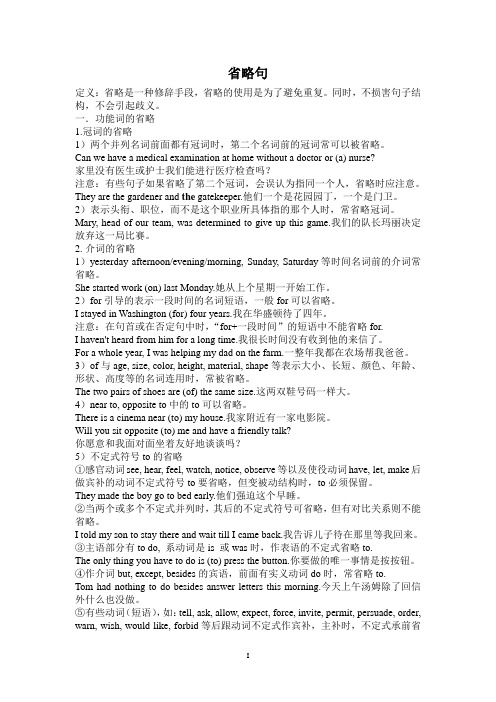
省略句定义:省略是一种修辞手段,省略的使用是为了避免重复。
同时,不损害句子结构,不会引起歧义。
一.功能词的省略1.冠词的省略1)两个并列名词前面都有冠词时,第二个名词前的冠词常可以被省略。
Can we have a medical examination at home without a doctor or (a) nurse?家里没有医生或护士我们能进行医疗检查吗?注意:有些句子如果省略了第二个冠词,会误认为指同一个人,省略时应注意。
They are the gardener and the gatekeeper.他们一个是花园园丁,一个是门卫。
2)表示头衔、职位,而不是这个职业所具体指的那个人时,常省略冠词。
Mary, head of our team, was determined to give up this game.我们的队长玛丽决定放弃这一局比赛。
2.介词的省略1)yesterday afternoon/evening/morning, Sunday, Saturday等时间名词前的介词常省略。
She started work (on) last Monday.她从上个星期一开始工作。
2)for引导的表示一段时间的名词短语,一般for可以省略。
I stayed in Washington (for) four years.我在华盛顿待了四年。
注意:在句首或在否定句中时,“for+一段时间”的短语中不能省略for.I haven't heard from him for a long time.我很长时间没有收到他的来信了。
For a whole year, I was helping my dad on the farm.一整年我都在农场帮我爸爸。
3)of与age, size, color, height, material, shape等表示大小、长短、颜色、年龄、形状、高度等的名词连用时,常被省略。
省略句(英语)

定义:为了避免重复,省略句中的一个或 几个成分,这种语法现象称为“省略”。
英语中省略现象较为普遍,对省略的考查已成 为高考中的热点。句子成分的省略,可分为以下 7种情况:
1.省略主语,主谓语或主谓的一部分 2.不定式符号to的省略 3.不定式结构中动词的省略 4.状语从句中的省略 5.定语从句中关系词的省略 6.虚拟语气中if和should的省略 7.not, so, neither, nor 的“替代性”省略
3. Sounds like a good idea. (It) sounds like a good idea. 4. Anything I can do for you? (Is there) anything I can do for you?Βιβλιοθήκη 省略主语,主谓语或主谓的一部分
(1) (I) Beg your pardon. 省略主语 (2) (It) Sounds like a good idea. (1) (Is) Anybody here? (2) (Is there) Anything I can do 省略谓语或谓 语的一部分 for you?
简单句中的省略
1、省略主语 祈使句中主语通常省略;其 它省略主语多限于少数现成的说法。 (1) (I) See you tomorrow.
(2) (It) Doesn’t matter.
2、省略主谓或主谓语的一部分 (1) (There is) No smoking .
(2) (Will you) Have a smoke ?
(1) (Are you) Hungry? (2) (I want) Orange juice, please.
省略主语 和谓语
高考英语省略句
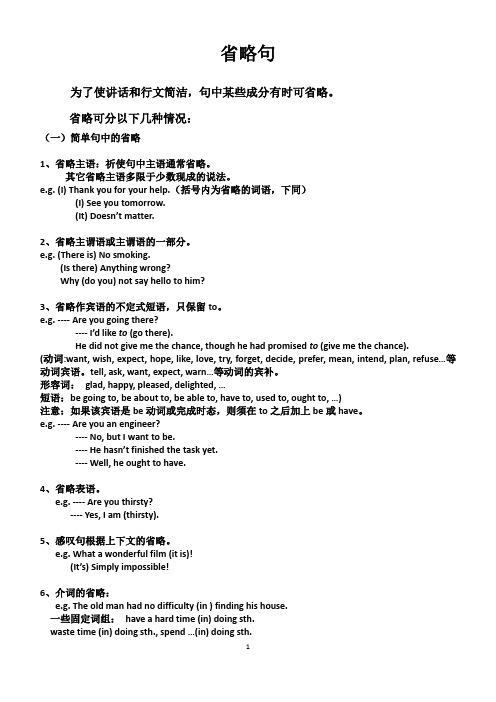
省略句为了使讲话和行文简洁,句中某些成分有时可省略。
省略可分以下几种情况:(一)简单句中的省略1、省略主语:祈使句中主语通常省略。
其它省略主语多限于少数现成的说法。
e.g. (I) Thank you for your help.(括号内为省略的词语,下同)(I) See you tomorrow.(It) Doesn’t matter.2、省略主谓语或主谓语的一部分。
e.g. (There is) No smoking.(Is there) Anything wrong?Why (do you) not say hello to him?3、省略作宾语的不定式短语,只保留to。
e.g. ---- Are you going there?---- I’d like to (go there).He did not give me the chance, though he had promised to (give me the chance).(动词:want, wish, expect, hope, like, love, try, forget, decide,prefer, mean, intend, plan, refuse…等动词宾语。
tell, ask, want, expect, warn…等动词的宾补。
形容词:glad, happy, pleased, delighted, …短语:be going to, be about to, be able to, have to, u sed to, ought to, …)注意:如果该宾语是be动词或完成时态,则须在to之后加上be或have。
e.g. ---- Are you an engineer?---- No, but I want to be.---- He hasn’t finished the task yet.---- Well, he ought to have.4、省略表语。
高中英语语法省略句

shorter
2 Mr Smith picked up a coin in the road and Mr Smith
handed it to a policeman
省略共同的主语或宾语
3 Jack must have been playing football and Mary must
have been doing her homework
: –Are you an engineer – No; but I want tobe : –He hasn’t finished the task yet
–Well; he ought to have
Attention
使役动词及感官动词后面作宾语补足语的不定 式一定要省去to;但在被动语态中须将to复原
: The order that weshsohuoludld stay where we are is very serious and severe
: It’s very important that studentsshsohuoludld study hard at school
※介词的省略※考点
从句中有一些成分被省略 而用so或not来代替
: Are you leaving for Beijing this Sunday I think so so I’m leaving for Beijing this Sunday
: Tom must be free today If so;sohe can help us
4 同时省略几个成分
: Let’s meet at the same place aswe met
yesterday
同时省略主 谓语
高中英语语法之省略句
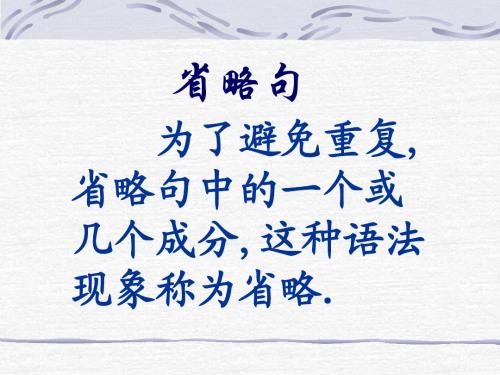
4.表示讲话人的意见和看法
(It) sounds fine to me. (It’s a) pity you couldn’t come.
5.提问
(Is there) anything wrong? (Have you) found the bike?
6.名词所有格修饰的名词若表示店铺,住 宅,教堂或上下文已暗示或明确指出过的 事物
省略句
为了避免重复, 省略句中的一个或 几个成分,这种语法 现象称为省略.
简单句中的省略
1.在对话中 --How is your mother today?
--(She is ) much better. 2.在祈使句中 (You) open the door,please. 3.在感叹句中 What a (good) boy (he is)! How (hard) they are working!
2)有时条件从句可以完全省去,只剩下主句。
3)以as,than 引导的比较状语从句可以全部或部分 省去。
I would have come yesterday (if I had wanted to).
After half a hour, she become quieter (than she had been.)
3.A computer does only what thinking people _________. (1999上海高考) A. have it do B. have it done C. have done it D. having it done
不定式在感官动词see, hear, feel, watch, notice, look at , listen to, overhear, observe 和使役动词 have, make, let 后 作宾语补足语时, 不定式省略to 。
2011届高考英语总复习《学案与测评》语法提升课件:专题13强调句、省略句、倒装句

3.倒装句 倒装句 (1) 表示否定意义或半否定意义的词置于句首时,常用部分倒装。 表示否定意义或半否定意义的词置于句首时,常用部分倒装。 常见的词有:seldom, never, hardly, no, not, little等。 常见的词有 , , , , , 等 Little did he know that the police were around. 他一点儿也不知道警察就在旁边。 他一点儿也不知道警察就在旁边。 Never before has our country been as united as it is. 现在我们的国家空前团结。 现在我们的国家空前团结。 (2) 由only,not until引导的状语置于句首时 常用部分倒装。 引导的状语置于句首时,常用部分倒装 , 引导的状语置于句首时 常用部分倒装。 Only by working hard can we succeed. 只有努力工作,我们才能取得成功 我们才能取得成功。 只有努力工作 我们才能取得成功。 (3) no sooner ...than, hardly ...when等结构中,no sooner 等结构中, , 等结构中 置于句首时, 和hardly置于句首时,主句用倒装形式。 置于句首时 主句用倒装形式。 No sooner had he arrived home, he began to prepare the supper.他一到家就开始准备晚饭。 他一到家就开始准备晚饭。 他一到家就开始准备晚饭 Hardly had he entered the room, it began to rain. 他一进屋就开始下雨了。 他一进屋就开始下雨了。
(3)虚拟条件句常省略 ,将were,had,should提前构成 虚拟条件句常省略if, 虚拟条件句常省略 , , 提前构成 倒装。 倒装。 Should there be a flood(=If there should be a flood), , what should we do? 如果发洪水,我们该怎么办? 如果发洪水,我们该怎么办 (4)有些状语从句置于句末,可以作句尾省略,有时也可以 有些状语从句置于句末,可以作句尾省略, 有些状语从句置于句末 省略整个从句。 省略整个从句。 John will go there if my brother will(go). 如果我哥哥去那儿,约翰也去。 如果我哥哥去那儿,约翰也去。 I would have come yesterday (If I had wanted to). 我昨天本来可以来的。 我昨天本来可以来的。
英语省略句
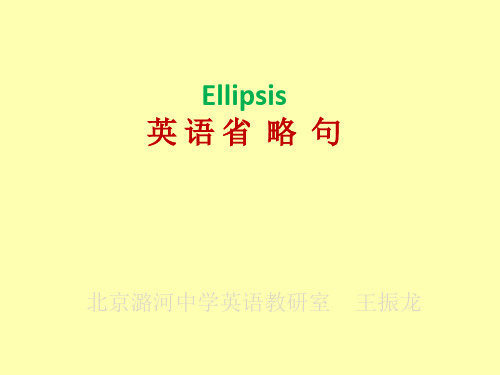
2、省略了一个从句或从句的一部分,用 so或not(切不可用it或that)代替。 e.g. ---- Is he coming back tonight? ---- I think so. ---- Is he feeling better today? ---- I’m afraid not. 这种用法常见的有:How so? Why so? Is that so? I hope so. He said so 及I suppose not. I believed not. I hope not 等。(但I don’t think so.比I think not.更 常用)。
3、省略作宾语的不定式短语,只保留to。 e.g. ---- Are you going there? ---- I’d like to (go there). He did not give me the chance, though he had promised to (give me the chance). 注意:如果该宾语是be动词或完成 时态,则须在to之后加上be或have。 e.g. ---- Are you an engineer? ---- No, but I want to be. ---- He hasn’t finished the task yet. ---- Well, he ought to have.
3、在某些状语从句中,从句的主语与主 句主语一致时,可省去“主语 + be”部 分。(参看“状语从句”有关部分)
4、连词if在部分虚拟条件句中可省略, 但后面的语序有变化.(参见“倒装句” 有关部分)
5、主句与从句各有一些成分省略。 e.g. The sooner (you do it), the better (it will be).
英语省略句讲解共23页

66、节制使快乐增加并使享受加强。 ——德 谟克利 特 67、今天应做的事没有做,明天再早也 是耽误 了。——裴斯 泰洛齐 68、决定一个人的一生,以及整个命运 的,只 是一瞬 之间。 ——歌 德 69、懒人无法享受休息之乐。——拉布 克 70、浪费时间是一桩大罪过。——卢梭
英语省略句讲解
51、没有哪个社会可以制订一部永远 适用的 宪法, 甚至一 条永远 适用的 法律。 ——杰 斐逊 52、法律源于人的自卫本能。——英 格索尔
53、人们通常会发现,法律就是这样 一种的 网,触可 以破网 而出, 只有中 等的才 会坠入 网中。 ——申 斯通 54、法律就是法律它是一座雄伟的大 夏,庇 护着我 们大家 ;它的 每一块 砖石都 垒在另 一块砖 石上。 ——高 尔斯华 绥 55、今天的法律未必明天仍是法律。 ——罗·伯顿
- 1、下载文档前请自行甄别文档内容的完整性,平台不提供额外的编辑、内容补充、找答案等附加服务。
- 2、"仅部分预览"的文档,不可在线预览部分如存在完整性等问题,可反馈申请退款(可完整预览的文档不适用该条件!)。
- 3、如文档侵犯您的权益,请联系客服反馈,我们会尽快为您处理(人工客服工作时间:9:00-18:30)。
3. Why are the functions of the skin described as _c_o_m__p_le_x_? It keeps you warm or cool; it prevents your body from losing too much water and provides you with your _s_e_n_s_e_ of touch.
bandage unbearable in place blisters ankle
over and over again scissors squeeze out temporary cupboard
Emma had a mild accident. She burned her _a_n_k_le_ when she knocked some hot liquid over herself. At first the pain was u_n_b_e_a_r_a_b_l_e but fortunately Luke knew what to do. He immediately provided some t_e_m__p_o_r_a_ry_ treatment using some cloths from the __cu__p_b_o_a_r_d_. He wetted them, _s_q_u_e_e_z_e_d__o_u_t__ the cold water and then placed them over her ankle.
人教课标版 高二必修5 Unit 5
Learning about Language
1 Complete the tables with the correct nouns, verbs or adjectives.
Verb injure swell bleed sprain poison
Noun
6. What are the _s_y_m_p__to_m__s_ of first degree burns? They are dry, red and mildly _sw__o_ll_e_n_.
3 Complete the passage using the words or phrases provided in their proper forms.
Adjective
injury swelling
injured swollen
blood/bleeding bloody/bleeding
sprain
sprained
poison
poisonous
Verb vary organize choke water infect
Noun variety organ choke water infection
Grammar – Ellipsis (省略)
为了使语言简洁或避免重复, 省略句中的一 个或几个句子成分, 这种语法现象称为省略。
(1) (I) Beg your pardon.
(2) (It) Sounds like a good idee? (2) (Is there) Anything I
4. What can hurt the _t_i_ss_u_e_ of the skin? Hot _l_iq_u_i_d_ from pans on the stove; electric shocks, radiation, fire and the sun.
5. What is it _v_i_ta_l_ to do if you have third degree burns? Go to the hospital.
can do for you?
谓语或谓语 的一部分
A: Where has Mr Smith
gone? B: Sorry, I don’t know
宾语
(where he has gone.)
(1) (Are you) Hungry? 主语和谓语
(2) (I want) Orange juice, (或主语和谓语
Adjective various organic choked watery
infected/infectious
2 Complete the sentences with new words or phrases from the unit.
1. When do you need to use your knowledge about __f_ir_s_t__ __a_id___? When somebody suddenly _f_a_ll_s_ __il_l _ or has an accident.
He did this _o_v_e_r_a_n_d__o_v_er__a_g_a_in__ until the pain disappeared. Then he dried the ankle gently to prevent _b_li_s_te_r_s_ from forming. Finally he took a pair of _sc_i_s_so_r_s and cut a _b_a_n_d_a_g_e_ to the right length. Then he tied it tightly so that it would stay _i_n_p_l_a_c_e_. Emma was very grateful to Luke for what he had done for her.
please.
的一部分)
A: Would you like to come to the party?
